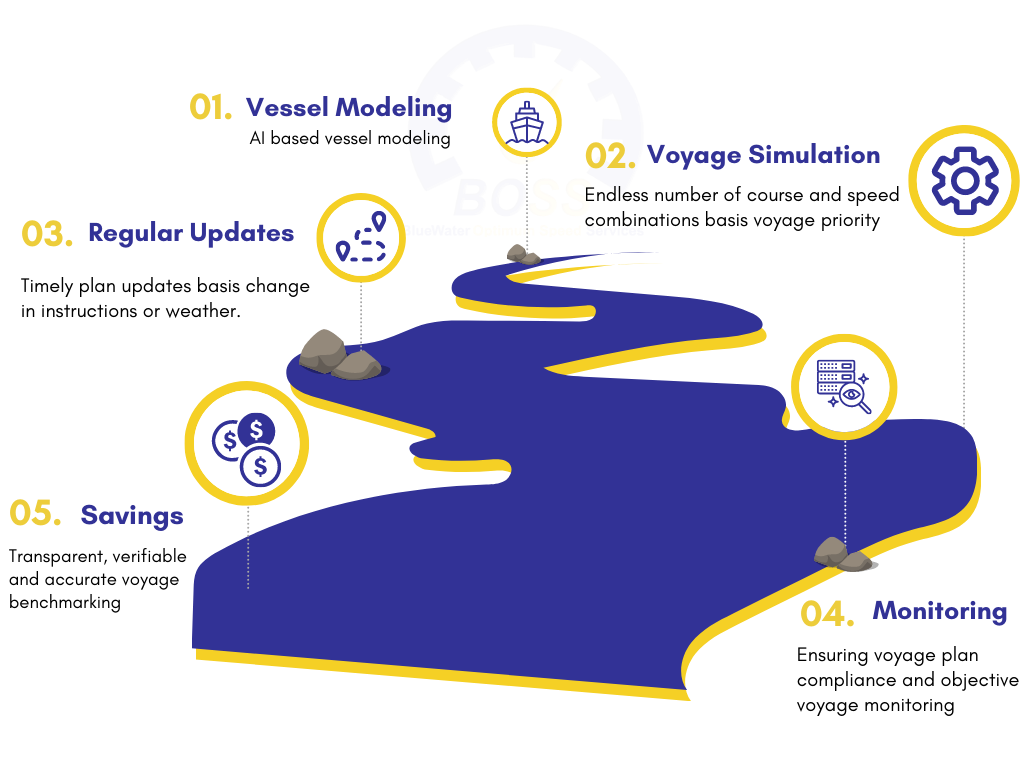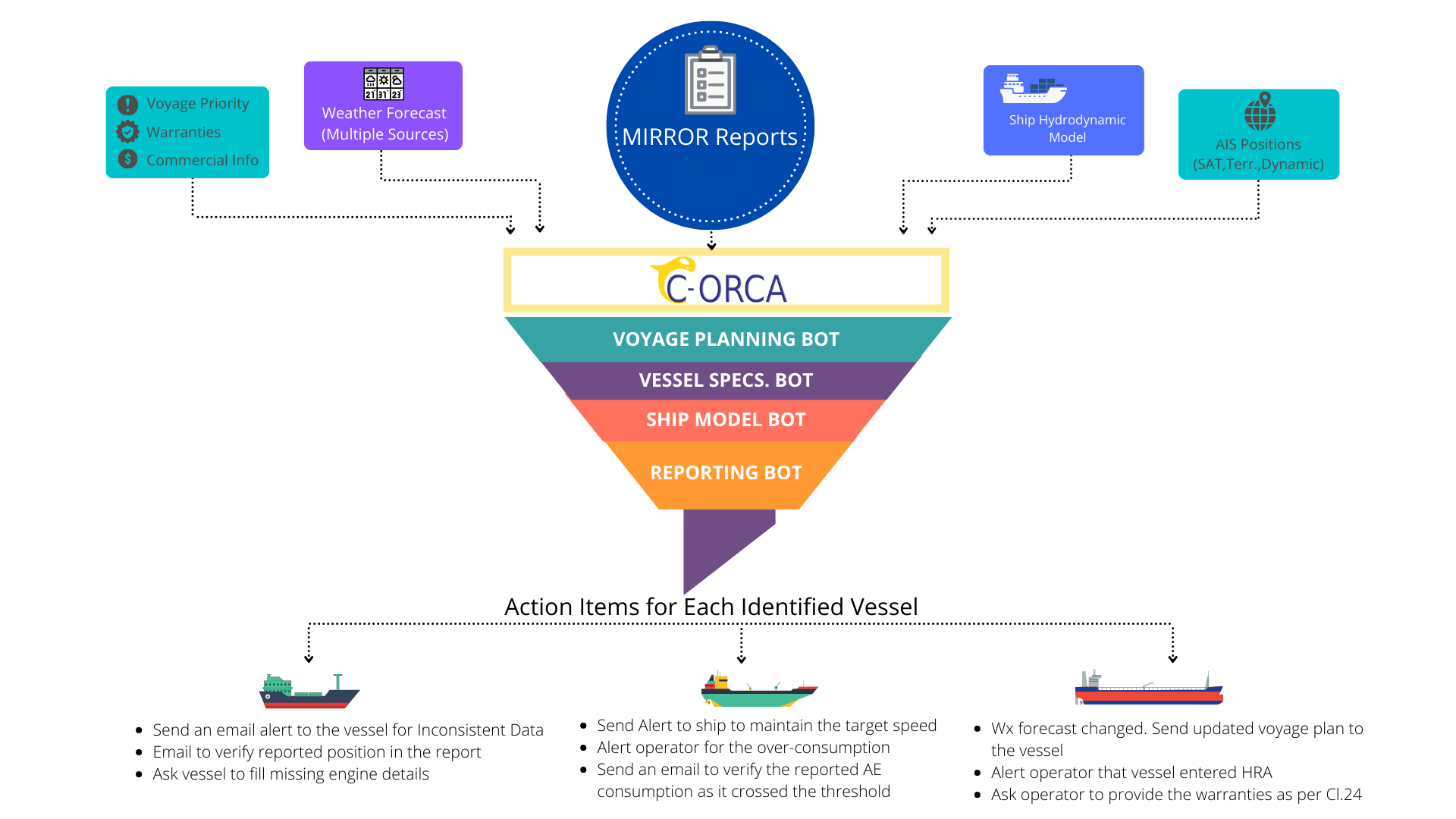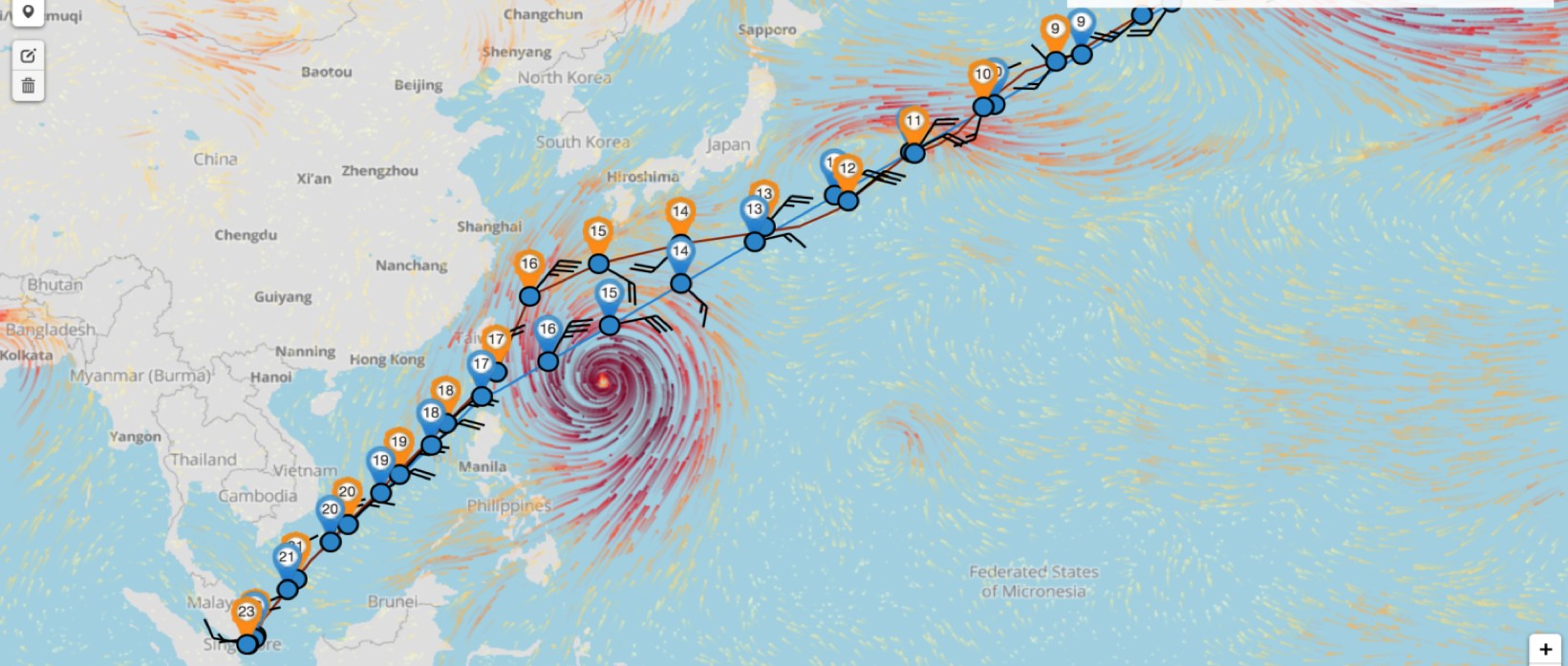For the past several years, the scope of voyage optimization has been limited to weather routing and weather advisory for a given sea passage. Seasoned mariners and meteorologists, with the help of a route search algorithm advise a route that minimizes bad weather exposure while maintaining a reasonable ship speed until the destination. This approach however, oversimplifies a rather complex problem and can lead to suboptimal fuel savings, weather damages and breach of commercial obligations.

Various factors like weather, vessel technical performance, voyage priorities in given market conditions, play a crucial role in determining the best possible route and speed advisory for a voyage. It is important to account for all these factors and accurately model the effect of each variable to derive the optimum speed and course schedule for a voyage. And preparing a voyage plan is only the first step of voyage optimization. Ensuring voyage plan compliance, monitoring the weather forecast and vessel performance, adapting the voyage plan to the changing voyage orders and priorities are all extremely important aspects of voyage optimization.
To solve the above challenges of optimum voyage planning and objective voyage monitoring, BlueWater bets on the latest advances in digital technology in its voyage optimization suite BOSS. For voyage planning, BOSS utilizes accurate vessel-specific hydrodynamic models, weather forecasts and exhaustive voyage simulation to determine the best possible voyage plan that optimizes the given voyage priority while adhering to charter-party terms and navigational constraints.
For ensuring objective and actionable voyage monitoring, BlueWater has developed an innovative voyage analyst C-ORCA. The AI assisted C-ORCA uncompromisingly analyzes several aspects of the vessel and voyage by validating and cross-verifying data from multiple sources to identify problems, find the root cause and suggest objective solutions. Not only does C-ORCA ensure voyage plan compliance but also ensures high quality and error-free data for reliable reports and performance analysis. It is no more a ‘garbage in and garbage out’ situation. The system enables quick informed decision making for hull & propeller cleaning, selection of right trading area to meet the challenges of CII rating, speed order changes during any voyage, selection of efficient vessels for TC and much more. Read more to find how BOSS voyage optimization stands apart.
How does BOSS voyage optimization stand apart?
Voyage Planning
- Accurate vessel modeling - The first step for deriving the optimum voyage plan for a given vessel is being able to predict vessel’s speed and fuel consumption in different weather conditions. Inaccurate vessel models result in inaccurate voyage estimates and sub-optimal voyage recommendations. BOSS’s vessel hydrodynamic models are based on well researched empirical models that are fitted with vessel-specific voyage data to reflect the current vessel performance. In the absence of any past voyage data, BOSS can accurately predict a vessel's performance based on a sister vessel’s data in our diverse database. BOSS continuously monitors the vessel model accuracy to identify performance deterioration or improvement and dynamically update the model to reflect the latest vessel performance.
- Exhaustive voyage simulation - To reach the destination at a given arrival time, there are an endless number of course and speed combinations. It is virtually impossible for a human expert to simulate these scenarios and find the optimum route by eye-balling the weather forecast. Heuristic route-search algorithms like the Djikstra algorithm simulate routes at a constant speed or RPM, leaving out options such as slow and fast steaming within the C/P constraints. BOSS exhaustively simulates all route and course combinations on a weather indexed grid between the source and destination to find the most fuel-efficient voyage plan for any given arrival time.
- Constraints - BOSS voyage planning algorithm can take into account several voyage constraints such as Charter party terms, vessel technical constraints, restricted areas, shallow patches and speed constraints to find a feasible schedule for the voyage. BOSS proactively collects this information through APIs, voyage initial report and past voyage data to determine vessel and voyage specific constraints.
Voyage Monitoring

Ensuring voyage plan compliance and objective voyage monitoring are challenging problems. For example, several factors can result in variance between vessel’s reported data with the voyage plan recommendations. These include variance in actual and forecast weather, inaccurate vessel hydrodynamic model used for simulation, change in voyage orders or non-compliance of recommended speed and course by the vessel. Not only is it important to detect such variance between actual and projected data, but it is also important to identify the root cause of the problem and to take corrective actions. The limitations of using human experts to identify and troubleshoot voyage monitoring issues became clear to us early on – Time-consuming, error prone and difficult to scale up to an increasing number of vessels.
To solve the above challenges, we developed the industry’s first AI assisted voyage monitoring system C-ORCA. C-ORCA is an ensemble of bots that continuously analyzes the incoming data streams from various sources and to identify issues related to weather, vessel performance, voyage plan compliance and data quality. Based on this analysis C-ORCA suggests corrective actions, composes emails and tracks the status of issues until they are resolved. More importantly C-ORCA can be easily customized to follow client-agreed voyage monitoring protocols.
Verifiable Savings
 What cannot be measured, cannot be optimized. Transparent, verifiable and accurate voyage benchmarking is important to quantify the savings obtained by engaging any voyage optimization service. Many voyage optimization solutions in the industry, often choose the warranted speed/consumption table of the vessel as a benchmark against which the actual voyage data is compared against. However, warranted consumptions for a given vessel are often an over-estimation of the actual vessel consumption and comparison against such data does not indicate the benefit of intelligent weather routing and speed scheduling.
What cannot be measured, cannot be optimized. Transparent, verifiable and accurate voyage benchmarking is important to quantify the savings obtained by engaging any voyage optimization service. Many voyage optimization solutions in the industry, often choose the warranted speed/consumption table of the vessel as a benchmark against which the actual voyage data is compared against. However, warranted consumptions for a given vessel are often an over-estimation of the actual vessel consumption and comparison against such data does not indicate the benefit of intelligent weather routing and speed scheduling.
The only logical solution for a benchmark voyage is simulating a scenario in which a voyage optimization solution is not engaged. This involves simulating a benchmark passage on the master's intended route following charter-party instructions in hindcast weather conditions. This approach however is sensitive to inaccuracies in the vessel hydrodynamic model used for simulation. To overcome this challenge, BOSS developed a benchmarking methodology that employs a corrected hydrodynamic model as per the vessel’s technical performance in the concluded passage. The savings against such a benchmark truly reflect the benefit of our voyage plan recommendations and are not attributed to exaggerated warranted consumptions or slow steaming. Contact us to read more about our white paper on benchmarking methodology.


